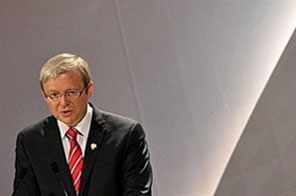PM apologises to 'Forgotten Aussie'
CANBERRA: Prime Minister Kevin Rudd made an emotional apology on Monday to half-a-million "Forgotten Australians" who faced sexual abuse, violence and forced labour in childcare homes over a period of decades.
Victims among the 1,000 people who packed Parliament House for the address burst into tears as Rudd detailed heart-rending cases of neglect in Australia's orphanages and institutions from 1930 to 1970.
"We come together today to offer our nation's apology. To say to you, the Forgotten Australians, and those who were sent to our shores as children without their consent, that we are sorry," he said.
"Sorry that as children you were taken from your families and placed in institutions where so often you were abused. Sorry for the physical suffering, the emotional starvation and the cold absence of love, of tenderness, of care.
"Sorry for the tragedy, the absolute tragedy, of childhoods lost. Childhoods spent instead in austere and authoritarian places where names were replaced by numbers, spontaneous play by regimented routine, the joy of learning by the repetitive drudgery of menial work."
Hundreds of thousands of poor children, including some 7,000 child migrants from Britain, were ripped from their homes to live in poorly monitored state and church-run homes where many were abused, ignored or forced to do unpaid menial work.
The statement has already made waves in Britain where Prime Minister Gordon Brown is set to apologise to more than 130,000 disadvantaged children who were shipped to Australia and other former colonies.
The comments also echo Rudd's historic February 2008 apology to Australia's downtrodden Aboriginal population for their mistreatment since white settlement in 1788.
A 2004 Senate inquiry recommended the apology after unearthing hundreds of disturbing stories from children placed in care after their families broke down, their mothers were unmarried or they were considered uncontrollable.
The probe found widespread assault and emotional, physical and sexual abuse, as well as neglect, humiliation and the deprivation of food, education and medical care.
Many never knew their parents or siblings, or even their own names, which could change each time they moved accommodation. Sometimes they were referred to simply by a number.
"The truth is, this is an ugly story. The truth is great evil has been done," Rudd said.
Many of the children were not told the truth about what happened to their parents, while their families were lied to as well, the inquiry found.
It said the legacy of these experiences had left many people emotionally scarred, with many resorting to drug and alcohol abuse and an "abnormally large" percentage committing suicide.
Some victims are still in prisons and mental health hospitals, while others suffer depression and feelings of worthlessness. Just days before the apology, one man who campaigned all his life for forgotten Australians killed himself.
"You have that insecurity and lack of self-esteem and all of that with you forever," Caroline Carroll, who chairs the Alliance for Forgotten Australians, told AFP ahead of the apology.
"That feeling of never being good enough doesn't go away."






